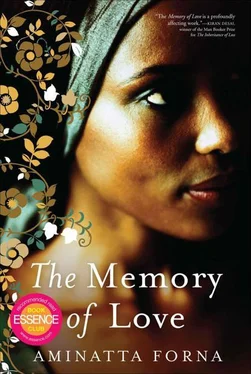‘Why not?’
‘Because it is pointless. Whatever happens will happen.’
Now he rolls over on to his back and watches the moon shadows on the ceiling. There is thunder in the distance. He rolls back to her, misjudges the distance between them and knocks his head hard against her face. The violence of the blow jars his teeth. He finds her mouth, kisses her and tastes blood, fetches a box of matches and strikes one against the dark.
‘I’ve hurt you,’ he says, peering at her lip. The match dies. He lies back down and places his arms around her. He can feel her shaking; a giggle escapes from the place between them. Suddenly they are both laughing.
In the morning, because he has already said things he did not intend to say and now is reckless, he asks, ‘Who have you loved the most?’
‘A man, you mean?’
‘Yes.’
‘Not a dog?’
‘No.’
‘Or a bat?’
‘Not a bat, either.’ He is happy to banter, but also insistent.
She is cleaning the kitchen, rubbing Vim on the surfaces. He likes that he is privy to her small domestic routines. She turns around to face him, her hands white with powder, a scouring sponge in one hand; milky water runs down her arm, drips off her elbow. Her face is smiling and yet serious. ‘You really want to know?’
‘Yes. Have you been in love before?’ He wants to know whether what is happening has happened before. As lovers always do. He feels like a cliché, it does not stop him.
‘Once.’ She holds up a whitened index finger. ‘Just once. We practically grew up together. We were together for ever, at least it felt like it.’
‘Would you have married him?’
‘Yes,’ she replies. There is no hesitation and it hurts him, a tiny thorn, though he had asked her to be honest. He is silent. She turns away to put the sponge in the sink and he comes up behind her, places his arms around her waist and rests his chin in the dip of her shoulder blade.
‘What happened?’
‘What usually happens. We grew in different directions. He was more ambitious than me. Eventually we’d grown so far apart we couldn’t touch each other any more. He changed, too.’ She shrugs.
Adrian stands still. She continues to rub at a stain on the counter. This game is too dangerous. He doesn’t want to ask any more questions. He stops speaking.
And Mamakay naturally asks him nothing at all.
Given the extra shifts he’d worked Kai was owed any number of days off. He let Seligmann know he’d be away for a day, preferring to avoid Mrs Mara. Abass was on holiday, bored at home, so Kai had invited him to come along. They left the city by way of the hospital, where Kai checked briefly on Foday. A doctor was a farmer, he told Abass; patients were crops that had to be watered or cows that needed milking. Together they passed by Adrian’s flat and found it empty. Kai noted the reordering of items, the books taken down from their shelves, the pair of coffee mugs.
They encounter little traffic and no accidents and thus make good time. There are vehicle tracks on the road to the falls. A couple of British military observers, a woman and a man picnicking on the rocks, provide theatre for a group of children. Kai raises a hand in greeting, but the couple do not return it and their gaze travels through him. And so, though Kai could free them from the bondage of the children’s stares, he chooses not to do so.
Abass goes to fish in the crevices between the rocks. Kai strips down to his shorts and dives into the cool water. The swim does little, though, to ease his restlessness. Like the British couple, he would have preferred to be alone. Once, on a trip here with Nenebah, they’d been invaded by a group of foreign engineers on a sightseeing trip from the dam. Tejani had driven away to explore the town, the two of them been on the point of making love interrupted by the arrival of the delegation in khaki shorts and open sandals. By the time Tejani came back, the men were gone. He’d thought they were fooling.
Did Nenebah ever come back here?
He climbs out and lies upon the rocks. Abass’s shadow looms over him, holding a sand skipper in his cupped hands. The Europeans get up and leave. One more swim, Kai tells Abass, and then it is time to go.
Past the petrol station and the queue of vehicles, they enter the town. In the square Kai parks the old Mercedes by a row of stalls and climbs down. Abass is hungry now and hovers in front of the food stalls. They buy chicken and wait while the stallholder griddles it over hot coals. Kai buys some bread from a neighbouring stall and they eat leaning against the car. Afterwards he gets behind the wheel and they move forward at a crawl, driving the route he walked just once, in the middle of a night six years ago.
‘Where are we going?’ asks Abass.
‘I’m looking for somebody I met here a long time ago.’
‘Will they still be here?’
‘I don’t know,’ answers Kai.
Abass winds down his window and hums. Kai is trying to feel the route, pacing his driving against the distantly remembered conversation of that night, the lefts and rights. The layout of the streets could have changed. Back then they’d been accompanied by soldiers, who’d led them, to their surprise, straight to the door. He swings the car around to the right, descends a steep section of track. Outside a low, bunker-shaped building he halts, orders Abass to wait, pulls his shirt over his mouth and nose and pushes at the door. Inside are the old refectory tables, broken glass and a burned mattress. Otherwise no sign of the laboratory that once stood there.
Somewhere in this town Kai has a cousin. In the marketplace he stops again at the food sellers to ask where he might find the street where the family live. Minutes later they arrive at the house. Somebody is sent to fetch Ishmail and he arrives smiling and buttoning his shirt, punches fists with Kai and then with Abass. They settle with their backs against the wall. Last time they met was some years before the war, before the city where Kai lived became an island within the rest of the country.
‘Long time, my friend,’ says Ishmail. ‘What brings you here?’
Kai tells him he is looking for Dr Bangura, the Lassa fever specialist. His cousin nods first, then shakes his head and tuts. The doctor is gone. Not the war, a pinprick to his finger. He was infected by the disease he’d been researching.
Kai is quiet, remembering the doctor working diligently over his samples late into the night, the household rubber gloves, the snorkel and mask in place of proper safety equipment. He would have died in agony.
Through the streets of the town, a slow, late-afternoon stroll. From time to time Ishmail raises a hand to people sitting on the steps of houses, shakes another’s hand, introduces Kai as his brother. Once they pass a house upon whose balcony six or so young men lounge. Unlike outside the other houses here there are no women, no children. Ishmail nods. One or two nod in return. There are no smiles and Ishmail does not introduce Kai as he has before. Down a road enclosed by houses on both sides, Abass, ahead of them, turns and, with a child’s expert memory, declares, ‘This is where we found Uncle Adrian after the bicycle hit him.’
Ishmail laughs. ‘Who is this that was hit by a bicycle?’
‘Uncle Adrian. We found him here and took him home.’
Ishmail turns questioningly to Kai.
Kai lets Abass get ahead once more, before he tells Ishmail. Afterwards they continue in silence until they reach a motel, partly rebuilt and painted, bristling with bamboo scaffolding. In the courtyard a nanny goat and her kid are tethered. The goat is bleating, a melancholy, repetitive sound. Abass is given a Fanta, which he carries outside to sit and watch the goat. Two men are following the football at the bar, dressed in the typical attire of government utility workers. Ishmail leads Kai to a table in the back of the room.
Читать дальше












